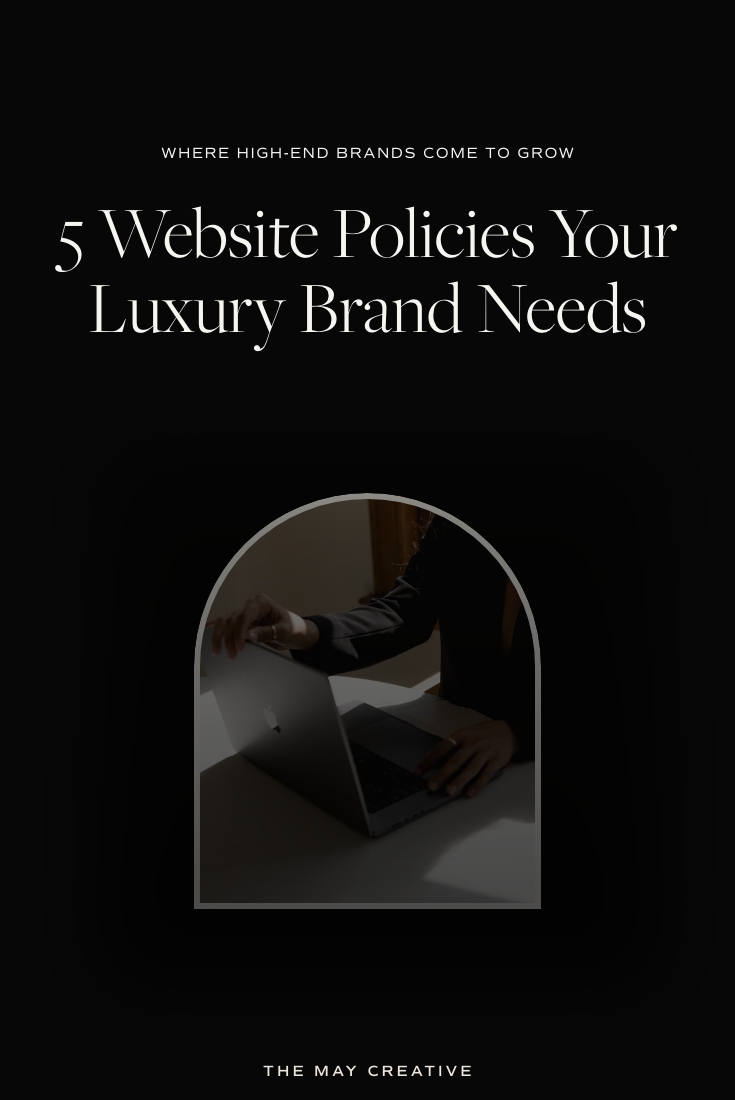As a luxury brand, you want to ensure you are covered with the right website policies. That’s why I thought reviewing 5 website policies your luxury brand needs would be a good idea.
I know that this isn’t the most exciting topic, but it’s important to have it in place so your website visitors can feel comfortable taking action on your website.
Plus, if not put into practice, website policies can expose your business to fines & fees. And we want to avoid that, so let’s take care of it now.
What Are Website Policies?
They are a set of guidelines that help protect your site visitors, customers, clients and your business from confusion. Policies exist to clarify what is happening when people interact with your business. It’s also a great way to set the tone for your approach to doing online business.
5 Website Policies Your Luxury Brand Should Have
Here are a few website policies you should have for your luxury brand. So you can ensure that you provide an amazing experience for your customers, clients, and other visitors.
Terms & Conditions
Terms & Conditions are in place to state the rules of engagement for your online business. Whether you use third-party links like (social media, email marketing, etc.) You need terms and conditions for some of the following reasons.
- Protect intellectual property or copyright infringement. If you create your own products, this is vitally important.
- Maintain control of your website and its users.
- Reduce the liability of any warranties you may offer for purchases on your website.
- Address commonly asked questions by customers so they can complete their purchases.
- Cover any potential damages you may be responsible for in case of a dispute.
When you’re serving quite a few people daily, you can see why all of this is important.
Return Policy
Another essential website policy, especially if have eCommerce, is your return policy. Having a clear return policy will help you reduce questions regarding handling concerns with purchases.
Depending on the type of products you are selling. You’ll want to be clear on exactly how your return policy works. Things to note so that customers are clear on your return policy are.
- Can they do returns at all?
- What types of products are allowed for returns?
- What is the expected condition of returned products (physical products)?
- How many days do they have to request a return?
- How does the return process work?
Make sure that this policy is in a visible location so that customers can refer to it as they are shopping. Having a clear return policy will also instill better trust in your brand & business.
Privacy Policy
Everyone who goes online wants to have their information protected. A privacy policy can help website visitors understand how their information is used and processed.
Some things that a privacy policy covers are
- How information is collected and used.
- Where the information comes from (such as sales transactions, analytics tracking).
- The legal basis for using this information (such as fulfilling an order transaction or contacting you regarding a purchase).
- How information is shared (for, ex. With third-party apps like subscription tools).
- How you protect your customers’ information.
These are just a few areas that a privacy policy will cover. Depending on which countries people are accessing your website from, there may be other policies you need to include.
Honestly, privacy policies are constantly changing as they adopt new rules all the time with the advances in technology such as artificial intelligence and beyond. More and more people are really looking into how their information is being used.
Seriously, look at any of the latest news regarding Facebook. Privacy and the use of information are some of the top conversation pieces.
Definitely make sure you are keeping your Privacy Policy up to date.
Shipping Policy
If you sell physical products, you’ll need to have a clear policy that discusses shipping. Your shipping policy can be an important determining factor in whether you make a sale. An online store shipping policy is a must.
Set the expectations around shipping timelines & costs early so there aren’t any surprises for your customers, especially when outside circumstances can affect how customers receive their items.
Communicate the right information that your customers need to help make better decisions.
Here are some ideas that your shipping policy should include:
- Order processing times (for ex., If 2-day shipping is not possible, let people know).
- Where do you ship? (Only domestic and/or international).
- Shipping costs (what qualifies for free shipping? if any).
- What are the delivery options? (for ex. Local pickup, in-store pickup, etc.).
- Order delays (life happens, so keep people up to date).
Tip: a good way to communicate your shipping policy is through an announcement bar on your website. This will help with transparency and sales conversions.
Personalization Policy
As a way to offer something unique to your customers, you may offer personalization of items such as embossing or engraving. If so, you’ll want to ensure you have a clear policy on how special products are handled.
Your customers will want to know
- If they can return personalized items
- Can they exchange personalized items
- What are the wait times for personalized items
This special product addition can add a more exclusive touch to your customers’ purchases by being clear on how you handle personalization in your business. Your customers will know what they are investing in, and they should also be sure that they are taking the time to review what they want before purchasing.
Where Should Your Website Policies Be Placed On Your Website?
A good place to showcase your policies is in the footer or bottom of your website. Most people expect to find that information in those areas of your website.
Another great place to add your policies is via the FAQ section of your site. For example, you could have a FAQ question that asks. What is your return policy? Then, answer the question as a response.
You may choose to pull out parts of your policies and place them on your website. For example, use an announcement bar on your website to communicate shipping information.
Now that you know you need these policies, where do you find them?
Resource for Website Policies
You can write your own policies or use some verbiage that some website platforms offer you. For example, Shopify will give a basic website policy to use. Or you can purchase a template that gives you most of the information you’ll need for an effective website policy.
One of my recommended resources is Termageddon (aff. link). Termageddon keeps up with all the latest privacy laws that are happening in the world. One of the major benefits of using their templates is that they keep them up to date. So, instead of buying a one-off template that never gets updated, you’ll have the latest information.
Termageddon offers a variety of templates that support different businesses. Here are a few policies that they’ll help you with:
- Cancellation policy
- Refund policy
- Subscription clauses
- Intellectual property rights clauses
- Protection from liability and lawsuits
- Plus, more
Using their online generator, you can generate your policies in no time and change them to include the custom language of your business.
So check Termageddon out. It’s cost-effective and can help you have ease of mind while navigating online.





